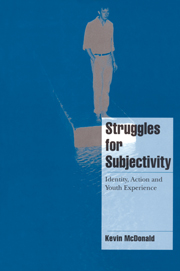Book contents
- Frontmatter
- Contents
- Acknowledgements
- Research participants
- 1 Introduction: subjectivity and social experience
- PART I The end of a working-class experience
- PART II Postmodern crisis: navigating the flow
- 7 None of the above: contemporary experiences of the gang
- 8 You'll be forgotten: visibility and mobility of graffiti writers
- 9 Between the body and the self: the anorexic terrain
- 10 We stand up for what we are: ethnicity and Aboriginality
- 11 Conclusion: struggles for subjectivity
- Bibliography
- Index
- Title in the series
7 - None of the above: contemporary experiences of the gang
Published online by Cambridge University Press: 05 December 2011
- Frontmatter
- Contents
- Acknowledgements
- Research participants
- 1 Introduction: subjectivity and social experience
- PART I The end of a working-class experience
- PART II Postmodern crisis: navigating the flow
- 7 None of the above: contemporary experiences of the gang
- 8 You'll be forgotten: visibility and mobility of graffiti writers
- 9 Between the body and the self: the anorexic terrain
- 10 We stand up for what we are: ethnicity and Aboriginality
- 11 Conclusion: struggles for subjectivity
- Bibliography
- Index
- Title in the series
Summary
Westview is a social experience where a series of social terrains collide, converging in the social meanings of place. In this chapter we encounter a different kind of urban experience, one that appears more shaped by a reemergence of gang experience than by questions of class identity and culture. The imperatives of mobilisation and the realities of marginalisation are present but references to working-class culture are largely absent, replaced with those of exclusion from the consumer society.
A number of the themes in this chapter can be introduced by contrasting American and British sociologies of the city (see Savage & Warde 1993). British sociology has tended to analyse the city in terms of the question of social class, local class cultures and communities being examined in terms of the system of class inequality (see Willis 1977). American work, since the Chicago school, has approached the city in terms of its capacities to integrate new populations, and is correspondingly preoccupied with expressions of urban exclusion such as the ghetto (Wirth 1956). American sociology analysed the city within the broader framework of the mass immigration to the United States during the 20th century, focusing on questions of immigration, ethnicity and inclusion/exclusion. British sociology, however, only recently confronted the questions of immigration, integration and exclusion which have long been posed in the American context. In the United States the sociology of the city has been constructed in terms of communities, in Britain in terms of class.
- Type
- Chapter
- Information
- Struggles for SubjectivityIdentity, Action and Youth Experience, pp. 125 - 138Publisher: Cambridge University PressPrint publication year: 1999



